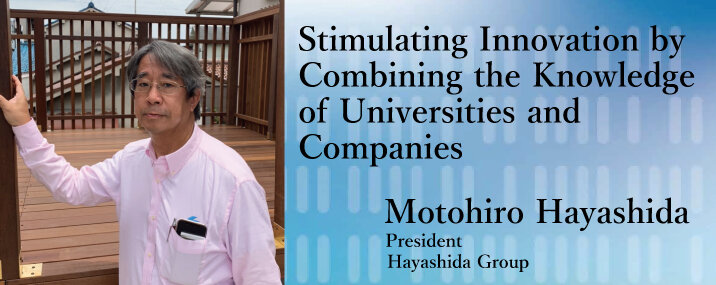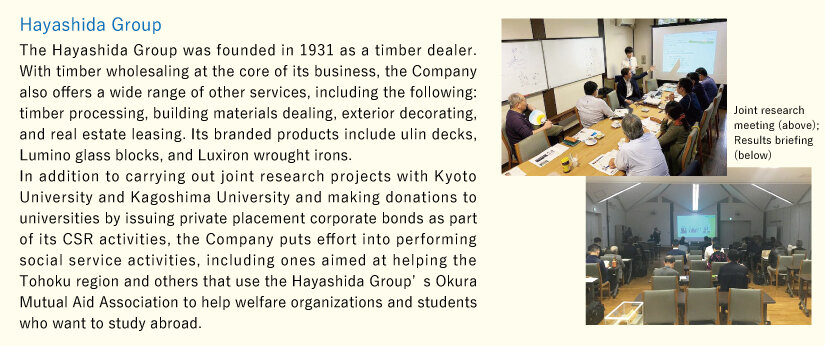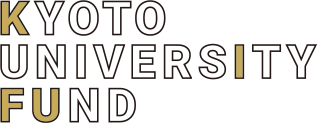Vol.18 Interview with Donors

Motohiro Hayashida
Born in Osaka Prefecture in 1960. Graduated from Waseda University's Department of Economics in the School of Political Science and Economics in 1983. Worked in Kyocera Corporation's International Sales Department. Earned a Master of Business Administration (MBA) degree from the University of Illinois at Chicago. Joined the Hayashida Group in 1985. Founded Hayashida International, Inc. (in Kentucky, USA) in 1991 and Pegasus Investment, Inc. (in West Virginia, USA) in 1999.
Serves as President and CEO of the Hayashida Group, Hayashida Lumbermill Company Limited, Hankai Sangyo Co. Ltd., Hayashida International, Inc., and Pegasus Investment, Inc.
Q Thank you for donating to the Fund in celebration of your son's
entering Kyoto University, and, if may I ask, what particularly
encouraged you to make the donation?
The first and foremost reason, of course, was that I wanted to financially support Kyoto University and its Faculty of Economics since they were, back in 2015--the year of my son's enrollment--where my son decided to begin his four years of college. Another reason was that I always wanted the University to keep developing. Although I graduated from a private university in Tokyo, I was born and brought up in Osaka. Every time I saw the University of Tokyo and Kyoto University competing with the world's top universities in the World University Rankings, I personally felt I wanted Kyoto University to take the lead and help Japan at the forefront of its efforts.
So, during the 1980s and 1990s, I was thrilled every time I saw Kyoto University's American football team, led by Coach Yaichi Mizuno, defeat other strong teams to eventually win the college championship and the Rice Bowl.
I have always been a fan of Kyoto University, so I was honored to be of some help by making a donation.
Q I heard that your company―the Hayashida Group―
and Kyoto University are conducting a joint research project;
how did that come about?
At one of the donor benefit events--the Thank-you Gathering--I had the honor of speaking with the University's president, executive directors, and professors about my company's business and research interests and was subsequently introduced to a number of experts who shared my interests.
My company's core business is timber wholesaling, and ulin--its branded product made of natural wood originally grown in Borneo, Indonesia--is famous for its at least century-long durability. I have always wanted to study that kind of wood from various perspectives, including its properties.
In 2016, Professor Kozo Kaneyama of the Research Institute for Sustainable Humanosphere (who retired in March 2020) and I embarked on a joint research project. Our first study investigated the legality of the use of ulin as timber. With help from the EU, Indonesia manages a system for thoroughly keeping track of the locations, manufacturing processes, and stocks of logs; however, no study had been conducted into the reliability of the system. We also studied the effectiveness of the use of wood waste in reducing environmental burden. Subsequently, I worked with Professor Tsuyoshi Yoshimura, a termite expert working at the same institute, on investigating ulin's amazing decay resistance. This year, I concluded an agreement with Professor Mamoru Kanzaki of the Graduate School of Agriculture on conducting research into tree planting rare species, including ulin, in tropical rainforests.
I keep coming up with new ideas for research, and every time I do, Kyoto University has an expert who can help me. I personally believe the University's greatest strength is the comprehensive range of research areas it covers.
Most other universities would probably not accept a small- or medium-sized company, such as mine, as their joint research partner. The greatest benefit that arose from donating to Kyoto University Fund was that it led to opportunities to directly consult and receive answers from the University's experts on the spot about possibilities of performing joint research.
There likely are many more small- and medium-sized companies with excellent technologies and product development skills wanting to conduct joint research with universities. I would like to ask the Kyoto University Fund to develop a system that could help such companies find matching experts.
Q What kinds of efforts do you look forward to seeing Kyoto University
make in this 125th anniversary year and after?
The very fact that Kyoto University is approaching its 125th anniversary bespeaks its long history of maintaining great breadth and depth of research capabilities. Yet, I would like the University to take precautions not to fall into complacency so that it can continue developing.
I always tell my employees that Japan's economic miracle was a period when everyone was on an upward escalator. So, reasonably decent efforts were all that were required to achieve higher levels. However, the escalator we are on today is heading downward. Those walking at slow paces are destined to drop to lower levels or, at best, become stuck where they are. If we want to ascend, we need to build up upward momentum, and one of the things I believe could help us gather that momentum is active industry-academia collaboration.
A university professor once told me that new knowledge can be discovered by digging deep into multiple pieces of old knowledge and combining them together in new ways. On the occasion of its 125th anniversary, I would like to ask Kyoto University to welcome more companies it has yet to meet as joint research partners and combine their knowledge with its traditional knowledge to achieve new breakthroughs. I have high expectations for Kyoto University as both my joint research partner and my son's alma mater.
(Interviewed in May 2020)


